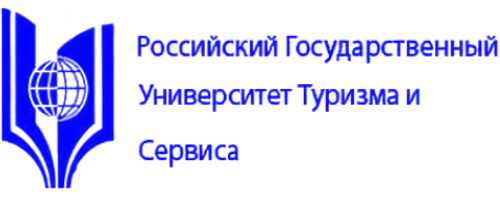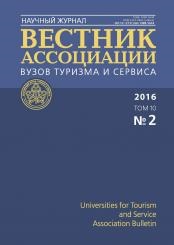Moscow, Russian Federation
Based on the theoretical analysis, the results of which are described in the previous publications of the author on the topic of international comparative educational research [8, 16—26], substantiated is structure of the model of the education system in the tourism sector, which is the unity of four interrelated subsystems: content, functionality, industry regulation and consumer. The model of education in the field of tourism is based on an integrative approach [16] to the analysis of factors of internal and external environment of education, it allows to search the determining changes in factors of the education systems [17, 18], identify patterns, to explain the possibility of borrowing pedagogical models, processes, phenomena, develop mechanisms of adaptation of pedagogical models, processes, phenomena, as well as to design useful pedagogical models of processes and phenomena. The author stresses the necessity of the use of scientific instruments in the research and development of training models that take into account the structural characteristics and process of education. As the properties of the model are determined by integrating the conceptual mainstream; for the purposes of the study of national models of training in the field of tourism as a mainstream concept adopted is the principle of integration of the national professional education in the global professional and educational space. In order to address the structural and process characteristics of the education systems the author proposes the relationships between the subsystems of the education system (functional, consumer, industry regulation and content) as the features of the system and the principles of the educational system as a social institution that ensures the reproduction and development of human potential as attributes of the system. In the article the subject of pedagogical analysis of educational systems is determined by the purpose and nature of the education system in the field of tourism as a sustainable set of integrated or integrating interacting elements which are subsystems. Developed is a heuristic model of education in the field of tourism which not only can help to carry out a comprehensive analysis of teaching, but also to compare national systems of vocational training, and by identifying their features, focus the mind on its own problems and bottlenecks and find points of growth of the potential and to develop mechanisms of adaptation of useful foreign experience.
model of education, education in the field of tourism, pedagogical analysis, comparative pedagogical research.
Введение. Международные сравнительные педагогические исследования позволяют выявить особенности национальной педагогической системы, сфокусировать взгляд на собственных проблемах и узких местах, обнаружить точки возможного роста, развития и т.д. В предыдущих статьях по тематике международных сравнительных педагогических исследований было выявлено актуальное состояние, методологические подходы, цели и задачи сравнительных педагогических исследований; а также обоснована необходимость системного исследования образования в сфере туризма, позволяющего учесть сущностные системные факторы, внутрисистемные и межсистемные связи, как, например, связь системы образования в сфере туризма и системы национального образования, рынка труда, государства как надсистемы нормативно-правовых ограничителей. Было также сформулировано положение о необходимости разработки концептуальных эвристических моделей (рис. 1), обладающих «системной независимостью», позволяющей переносить модель с одной системы на другую с сохранением ее композиции при решении задач сравнения различных систем. В нашем случае речь идет о модели системы образо-
1. Abramova, N. T. Tselostnost´ i upravlenie [Integrity and management]. M.: Nauka, 1974.
2. Anan´eva, T.N., Kobeleva, O. V., Sakharchuk, E. S. Mezhdunarodnyi opyt obrazovaniia v sfere turizma (na primere Ger-manii) [International experience in tourism education (for example, Germany)] // Servis plus [Service plus]. 2010. № 4. pp. 59-64.
3. Afanas´ev, KG. Obshchestvo, sistemnost´, poznaniei upravlenie [Society, consistency, knowledge, and management]. M.: IPL, 1981.
4. Blaumberg, I. V. Iudin, E. G. Stanovlenie i sushchnost´ sistemnogo podkhoda [Formation and essence of a systematic approach]. M.: Nauka, 1973.
5. Viner, N. Kibernetika [Cybernetics]. M.: Sov. Radio, 1968.
6. Grin´, A. Sistemnye printsipy organizatsii ob»ektivnoi real´nosti [System principles of the objective reality] // green.narod. ra (data obrashcheniia: 20.03.2015) [Accessed on March 20, 2015].
7. Zhilina, A. I. Sistemnyi podkhod как metodologiia pedagogicheskogo issledovaniia [System approach as a methodology of pedagogical research] // Chelovekiobrazovanie. 2007. № 10-11.
8. Il´kevich, S.V., Sakharchuk, E.S. Ekonomicheskie aspekty ustoichivogo razvitiia turizma v regionakh Rossiiskoi Feder-atsii//Vestnik Assotsiatsii vuzov turizma i servisa [Universities for Tourism and Service Association Bulletin]. T. 8. 2014. pp. 4-17.
9. Konarzhevskii, Iu.A. Sistemnyi podkhod к analizu vospitatel´nogo meropriiatiia [Systematic approach to the analysis of educational activities]. Cheliabinsk: ChGPI, 1980.
10. Kortunov, V. V. Prolegomeny к metodologii verifikatsii irratsional´nykh system [Prolegomena to the methodology of verification irrational systems]. M., 1999. T. 1. Aktual´nye issledovaniia.
11. Kuz´mina, N. V. Poniatie «pedagogicheskaia sistema» i kriterii ее otsenki [The concept of «educational system» and the criteria for its evaluation] // Metody pedagogicheskogo issledovaniia. L.: LGU, 1980.
12. Loiko, О. Т., Demchenko, A. R. Sravnitel´no-pedagogicheskie issledovaniia sistem obrazovaniia Rossii i zarubezhnykh stran [Comparative educational research of education systems in Russia and abroad] / Topical Problems of Professional Pedagogics/2013. № 2 (10).
13. Matorin, S.I. Sistemologiia i ob»ektno-orientirovannyi podkhod [Systemology and object-oriented approach] // NTI. Ser. 2. 2001. №8.
14. Osnovnye poniatiiai terminy sistemy obrazovaniia [The basic concepts and terms of the education system]. Tiumen´, 2001.
15. Petrov, A. E. Tenzornaia metodologiia v teorii system [Tensor methodology in systems theory]. M.: Radio i sviaz´, 1985.
16. Sakharchuk, E.S. Analiz modeli podgotovki kadrov dlia sfery turizma Norvegii // Vestnik Assotsiatsii vuzov turizma i servisa [Universities for Tourism and Service Association Bulletin]. T. 8. 2014. № 4. pp. 78-85.
17. Sakharchuk, E.S. Sotsial´nye posledstviia razvitiia turizma [The social consequences of tourism development]: Mono-grafiia. M.: Rossiiskii gosudarstvennyi universitet turizmai servisa, 2009.
18. Sakharchuk, E. S. Uchet globalizatsionnykh protsessov как printsip sravnitel´nogo pedagogicheskogo analiza modelei obrazovaniia v sfere turizma [Accounting for globalization processes as a principle of comparative analysis of pedagogical models of education in the field of tourism] // Vestnik Assotsiatsii vuzov turizma i servisa [Universities for Tourism and Service Association Bulletin]. T. 9. 2015. № 1. pp. 77-84.
19. Sakharchuk, E.S., Vinogradova, M. V. Ispol´zovanie mezhdunarodnogo opyta v formirovanii sistemy otsenki kachestva professional´noi podgotovki i attestatsii personala sfery turizma (na primere ob»ektov razmeshcheniia) [Utilizing international experience in the formation of quality assessment system of training and certification of personnel in the tourism industry (for example, accommodation facilities)]: Monografiia. M.: Rossiiskii gosudarstvennyi universitet turizma i servisa. № gos. registratsii 0321301681.
20. Sakharchuk, E.S., Grain, E. Sistema podgotovki kadrov dlia turizma v Avstrii [Training system for tourism in Austria] // Vestnik Assotsiatsii vuzov turizma i servisa [Universities for Tourism and Service Association Bulletin]. 2013. № 4 (27). pp. 78-85.
21. Kharitonova, T. V., Il´kevich, S. V., Sakharchuk, E. S. Sovremennye podkhody к optimizatsii uchebnykh planov osnovnykh obrazovatel´nykh programm akademicheskogo bakalavriata v oblasti turizma [Contemporary approaches to optimization of curricula of basic educational programs of academic bachelor in the field of tourism] // Vestnik Assotsiatsii vuzov turizma i servisa [Universities for Tourism and Service Association Bulletin]. T. 8. 2014. № 4. pp. 31-36.
22. Fedulin, A.A., Sakharchuk, E.S., Ilkevich, S. V. Moscow regional education cluster in tourism and services: a new sustainable development paradigm. World Applied Sciences Journal. 2014. T. 30. N 30. pp. 80-81.
23. Sakharchuk, E.S., Ermakov, A.S., Korneev, A.A. Development of a mathematical model for optimization of transport routes for auto tourists. World Applied Sciences Journal. 2013. T. 27. pp. 474-477.
24. Sakharchuk, E.S., Khanbabaeva, Z.M., Daitov, V. V. Analysis of practice centered aspects of educational programs in the shere of tourism and hospitality. World Applied Sciences Journal. 2013. T. 27. № 13. pp. 305-308.
25. Sakharchuk, E.S., Kharitonova, T. V., Krivosheeva, T.M., Ilkevich, S. V. The study of the present state and prospects of cultural tourism in the Russian Federation (exemplifying Moscow Region). World Applied Sciences Journal. 2013. T. 27. N13. pp. 309-314.
26. Sakharchuk, Elena, Ilkevich, Sergey The competency profile of cultural tourism employees in Russia. The values of tour-ism//The 23rd Nordic Symposium On Tourism and hospitality research. Copenhagen business school, 2014. pp. 64-65.





